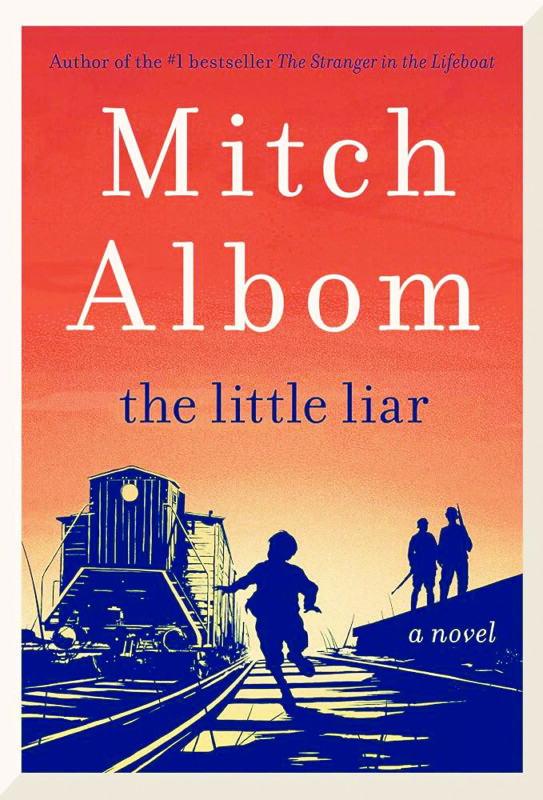The Little Liar, by Mitch Albom (Harper, 333 pages)
There’s a downside to being the author of a runaway bestseller like Tuesdays With Morrie. It’s that every book you write from that point on will be compared to the most successful one.
In Mitch Albom’s case, the success of his 1997 memoir about conversations he had with his former professor, who was dying of ALS, made him turn to fiction. While his subsequent books haven’t enjoyed the popularity of Tuesdays, which is among the best-selling memoirs of all time, Albom has a loyal following and continues to write columns and books. His latest, The Little Liar, is an imaginative and often troubling story that is part historical fiction and part morality play.
The titular character is an 11-year-old boy named Nico who, at the start of the novel, lives with his family in 1943 in Salonika, a city that at the time had the largest Jewish population in Greece. The Nazis have invaded and are driving Jewish families from their homes and into ghettos with the intent of sending them to concentration camps.
A Nazi officer recruits Nico to assure the families that they are merely being “resettled” and will have jobs and new homes in Poland. Nico is the ideal child for this job, as he is “a boy to be believed,” having no experience with lying; he is so honest naturally that he doesn’t fib even a little bit when asked, for example, if he has done the required reading in school, or if he was tagged in a game of chase. Nico’s believability is enhanced by his good looks: He is an extraordinarily beautiful child, so much so that strangers on the street stop to comment on his appearance.
And because he is so honest, Nico does not doubt the lies fed to him by a young Nazi officer named Udo, who promises Nico that his own family will be safe. Because he does not lie, he can’t envision that others do. So he willingly goes up and down the train platforms telling the anxious waiting families that he has heard that all will be well.
Things fall apart when Nico sees his own family loaded onto a train, and he finds out they are going not to new homes but to Auschwitz. Among them is Nico’s oldest brother, Sebastian, and a family friend, the same age as Nico, named Fannie.
The rest of the novel follows each of those characters — Nico, Sebastian, Fannie and Udo — throughout their lives, showing how Nico’s unintentional deceit affected all of them, even as adults.
These characters were invented by Albom, who said he got the idea for the novel after visiting a museum and learning that Jews were used to convince others to board the trains bound for death camps. “That perversion of truth, with life and death on the line, stayed with me for months and even years later,” Albom wrote in an author’s note.
Some of the characters in The Little Liar, however, were real people, including Katalin Karady, a Hungarian actress who used her fame and money to rescue 20 Jewish children who were about to be murdered by the Nazis.
The main conceit of the novel is that the story is told in first person by a mythological being: the Angel of Truth. This character comes from an ancient parable about how, when God was creating the Earth, he consulted angels with names like Mercy, Righteousness and Truth, and Truth was the only one who advised God not to create humans, because, as Truth said, they would tell lies.
“So what did the Lord do? He considered all that was said. Then He cast Truth out of heaven and threw him to the depths of the earth,” Albom writes.
This parable is not Albom’s creation but part of the Jewish tradition. But Albom makes Truth the storyteller, which allows for occasional soliloquies into the nature of truth and lies, e.g., “Truth is universal. You often hear that expression. Nonsense. Were I truly universal, there would be no disagreement over right and wrong, who deserves what, or what happiness means.” And, “Of all the lies you tell yourself, perhaps the most common is that, if you only do this or that, you will be accepted.”
As the novel went on, this narration started to feel a little contrived, but it all comes together with a clever ending that is surprising and satisfying. This is no small feat, given the dark subject matter that comprises most of the book, during the events of World War II and in the anger, bitterness and resentment that festers in later years.
As the characters travel different paths — Nico turning into another person altogether in an attempt to atone for his past — Albom explores moral questions such as whether there are sins that can’t be forgiven no matter what we do later in life, and whether any amount of atonement can release us from the torment of our own conscience. These are complex questions for the simple language used in this book, but Albom, like his teacher before him, has proven himself to be an exemplary storyteller. B+






